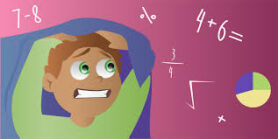Wiskundeangst, rekenangst

|
Het vak rekenen-wiskunde wordt in het onderwijs zeer vaak als ‘selectie-vak’ gebruikt. Selectie betekent per definitie uitsluiting (de leerling die een bepaald niveau niet haalt). Dit is een belangrijke oorzaak van angst voor rekenen-wiskunde (‘math-anxiety’). Zie ook mindset, diagnostisch gesprek. |
Samenhang met andere factoren
Rekenangst hangt samen met diverse andere ‘psychologische’ factoren.
| Dagelijkse leven | Schoolse taken | Rekentaken | |
| Zelfvertrouwen | |||
| Motivatie | |||
| Positief zelfbeeld | |||
| Samenwerking | |||
| … |
Rekenangst in het mbo
Deze video laat zien welke factoren invloed hebben op rekenprestaties, als het gaat om angst, ervaring uit het eerdere onderwijs, e.d.(Kees Hoogland)
Verwijzingen (Nederlands)
- Jansen, B. (2013). Emotionele beleving van rekenen – het Groot Nationaal Onderzoek van Rekenen (PDF). In M. Van Zanten (Ed.), Rekenen-wiskunde op niveau Panama Cursusboek – Verslag van de 31e Panama-conferentie gehouden op 31januari & 1 februari 2013 te Utrecht (Vol. 31, pp. 67-77). Utrecht: Panama/ Freudenthal Instituut, Universiteit Utrecht.
- Jonker, V. and Wijers, M. (2018). Rekenen, eigen vaardigheid. Module 5 van de opleidingsmodules docent basisvaardigheden (PDF). Ede: Steunpunt basisvaardigheden.
Verwijzingen (Engels)
- Ashcraft, M. H. and Kirk, E. P. (2001). The relationships among working memory, math anxiety, and performance Journal of Experimental Psychology: General, 130(2), 224–237. .
- Ashcraft, M. H. and Krause, J. A. (2007). Working memory, math performance, and math anxiety (PDF) Psychonomic Bulletin & Review, 14(2), 243-248. .
- Ashcraft, M. H. and Moore, A. M. (2009). Mathematics anxiety and the affective drop in performance Journal of Psychoeducational Assessment, 27(3). doi:10.1177/0734282908330580 .
- Boaler, J. (2018). Developing Mathematical Mindsets. The need to interact with numbers flexibly and conceptually (PDF) American Educator, Winter 2018-2019. .
- Carey, E., Hill, F., Devine, A. and Szücs, D. (2016). The chicken or the egg? The direction of the relationship between mathematics anxiety and mathematics performance Frontiers in Psychology, 6(JAN), 1-6. doi:10.3389/fpsyg.2015.01987 .
- Chang, H. and Beilock, S. L. (2016). The math anxiety-math performance link and its relation to individual and environmental factors: A review of current behavioral and psychophysiological research Current Opinion in Behavioral Sciences, 10, 33–38. doi:10.1016/j.cobeha.2016.04.011 .
- Dondio, P., Gusev, V. and Rocha, M. (2022). Do games reduce maths anxiety? A meta-analysis (PDF) Computers & Education, Available online 26 October 2022. doi:10.1016/j.compedu.2022.104650 .
- Dowker, A., Sarkar, A. and Looi, C. Y. (2016). Mathematics Anxiety: What Have We Learned in 60 Years? Frontiers in Psychology, 7(APR). doi:10.3389/fpsyg.2016.00508 .
- Foley, A. E., Herts, J. B., Borgonovi, F., Guerriero, S., Levine, S. C. and Beilock, S. L. (2017). The math anxiety-performance link Current Directions in Psychological Science 26(1), 52–58. doi:10.1177/0963721416672463 .
- Jansen, B., R.J., Louwerse, J., Straatemeier, M., Van der Ven, S. H. G., Klinkenberg, S. and Van der Maas, H. L. J. (2013). The influence of experiencing success in math on math anxiety, perceived math competence, and math performance (PDF) Learning and Individual Differences, 24, 190–197. .
- Ramirez, G., Shaw, S. T. and Maloney, E. A. (2018). Math Anxiety: Past Research, Promising Interventions, and a New Interpretation Framework Educational Psychologist, 53(3), 145-164. doi:10.1080/00461520.2018.1447384 .
- Ren, L., Green, J. L. and Smith, W. M. (2016). Using the Fennema-Sherman Mathematics Attitude Scales with lower-primary teachers Mathematics Education Research Journal, 28(2), 303–326. doi:10.1007/s13394-016-0168-0 .


